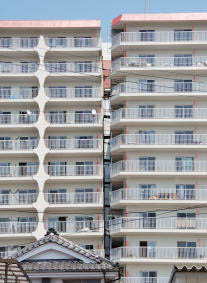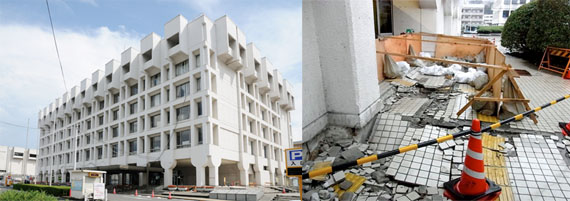New earthquake resistant certification in Tokyo
The Tokyo government is introducing a new certification system for residential buildings that can continue to be habitable after a large earthquake. Developers and building association unions can apply for recognition starting in April this year. If a building has the certification, it is thought that the apartments will be easier to market by developers, but actual construction costs will be higher which may result in a higher selling price.Read more
Growing concern over Tokyo's shortage of emergency evacuation centers
- 1.3 million residents will be turned away
- 2.39 million residents will lose their homes
- 4.48 million residents will be stranded until transportation services resume
Tokyo City is currently unable to provide enough emergency accommodation for the temporary refugees that would not be able to return home in the event of a magnitude 7 earthquake hitting Tokyo.Read more
30% of apartments with base isolation systems suffered damage in earthquake
A survey by the Japan Society of Seismic Isolation found that 30% of buildings constructed with base isolation (menshin) systems suffered damage to the building dampers during the March 11 Tohoku earthquake.Read more
Shinagawa apartment building to become an emergency evacuation shelter
A condominium apartment building in Tokyo's Shinagawa-ku will be the first residential building in Tokyo's 23 wards to be designated as an emergency shelter.Read more
100 condominiums in Sendai City need rebuilding
 In Sendai City, a condominium that was seriously damaged by the March 11 Tohoku Earthquake is scheduled to be demolished. Sunny Heights Takasago is a 14-storey apartment building with 189 units. The earthquake damaged the foundations and the building began to lean at a dangerous angle, threatening neighboring buildings. Demolition is scheduled to begin by the end of December and should be completed within 6 months. This is the first case in Sendai City of an apartment building of this size being demolished due to the effects of the Tohoku earthquake, but it won't be the last.Read more
In Sendai City, a condominium that was seriously damaged by the March 11 Tohoku Earthquake is scheduled to be demolished. Sunny Heights Takasago is a 14-storey apartment building with 189 units. The earthquake damaged the foundations and the building began to lean at a dangerous angle, threatening neighboring buildings. Demolition is scheduled to begin by the end of December and should be completed within 6 months. This is the first case in Sendai City of an apartment building of this size being demolished due to the effects of the Tohoku earthquake, but it won't be the last.Read more
Buy-back scheme for tsunami-hit land
The Japanese Government has announced a new buy-back scheme whereby the residential and farming land along Japan's tsunami-hit coastline will be bought up by the relevant cities and towns at slightly higher prices.
The purchase price for the land will be calculated by its estimated market value in five years from now. This is based on the government's 5-year post-quake reconstruction plan which includes restoring all infrastructure to the disaster-hit areas.Read more
Mito City Hall at risk of collapse

Mito City Hall in Ibaraki Prefecture was seriously damaged by the March 11 earthquake. Results of a recent earthquake-resistance inspection found that the building could collapse if it is hit by another earthquake with a seismic intensity of 6 or higher.
Should the City decide to repair the building by installing a base-isolation system, the repair costs are estimated to reach 7 billion Yen (91 million USD).Read more
